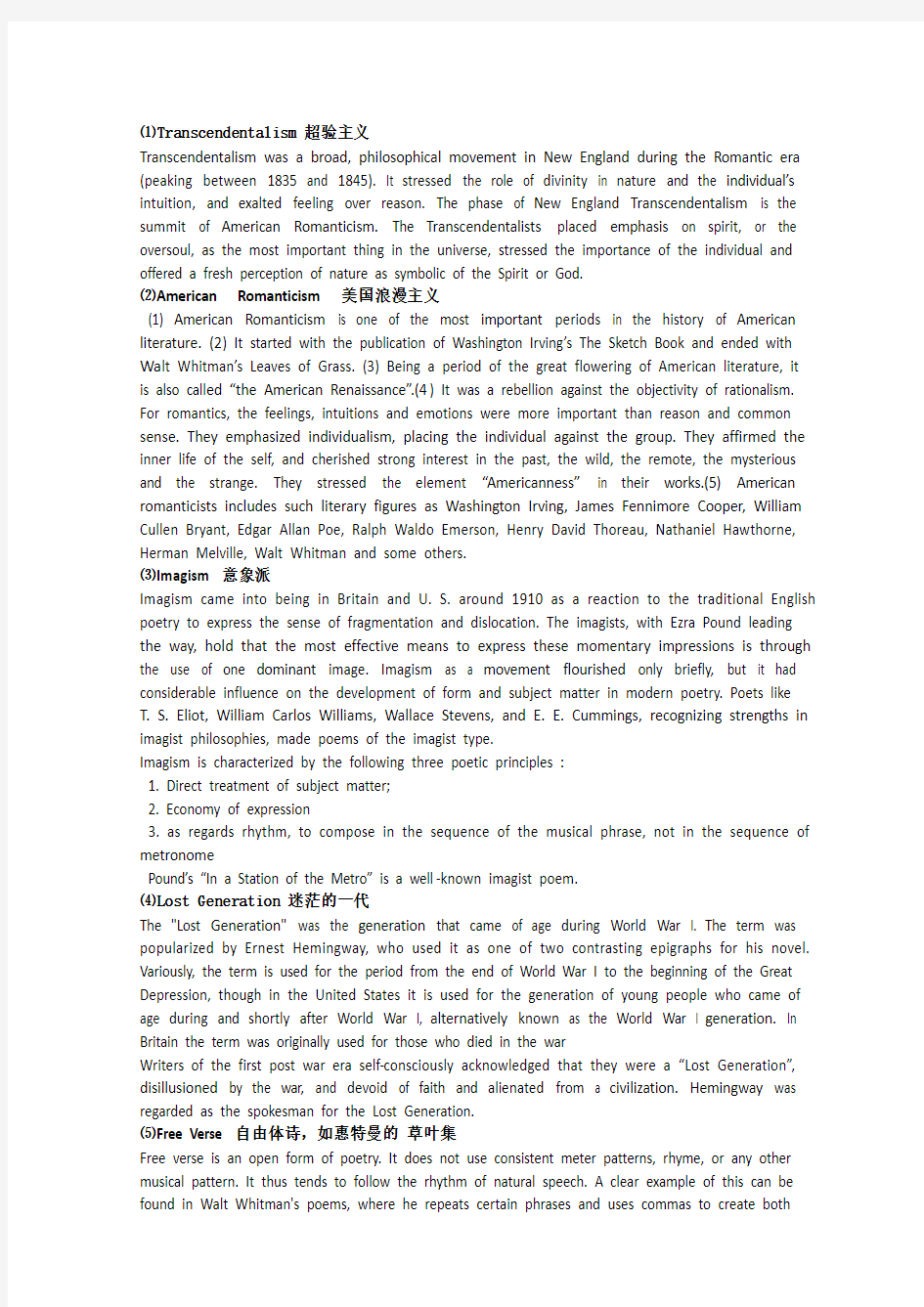美国文学复习考点

- 1、下载文档前请自行甄别文档内容的完整性,平台不提供额外的编辑、内容补充、找答案等附加服务。
- 2、"仅部分预览"的文档,不可在线预览部分如存在完整性等问题,可反馈申请退款(可完整预览的文档不适用该条件!)。
- 3、如文档侵犯您的权益,请联系客服反馈,我们会尽快为您处理(人工客服工作时间:9:00-18:30)。
⑴Transcendentalism 超验主义
Transcendentalism was a broad, philosophical movement in New England during the Romantic era (peaking between 1835 and 1845). It stressed the role of divinity in nature and the individual’s intuition, and exalted feeling over reason. The phase of New England Transcendentalism is the summit of American Romanticism. The Transcendentalists placed emphasis on spirit, or the oversoul, as the most important thing in the universe, stressed the importance of the individual and offered a fresh perception of nature as symbolic of the Spirit or God.
⑵American Romanticism 美国浪漫主义
(1) American Romanticism is one of the most important periods in the history of American literature. (2) It started with the publication of Washington Irving’s The Sketch Book and ended with Wa lt Whitman’s Leaves of Grass. (3) Being a period of the great flowering of American literature, it is also call ed “the American Renaissance”.(4) It was a rebellion against the objectivity of rationalism. For romantics, the feelings, intuitions and emotions were more important than reason and common sense. They emphasized individualism, placing the individual against the group. They affirmed the inner life of the self, and cherished strong interest in the past, the wild, the remote, the mysterious and the strange. They stressed the element “Americanness” in their works.(5) American romanticists includes such literary figures as Washington Irving, James Fennimore Cooper, William Cullen Bryant, Edgar Allan Poe, Ralph Waldo Emerson, Henry David Thoreau, Nathaniel Hawthorne, Herman Melville, Walt Whitman and some others.
⑶Imagism 意象派
Imagism came into being in Britain and U. S. around 1910 as a reaction to the traditional English poetry to express the sense of fragmentation and dislocation. The imagists, with Ezra Pound leading the way, hold that the most effective means to express these momentary impressions is through the use of one dominant image. Imagism as a movement flourished only briefly, but it had considerable influence on the development of form and subject matter in modern poetry. Poets like T. S. Eliot, William Carlos Williams, Wallace Stevens, and E. E. Cummings, recognizing strengths in imagist philosophies, made poems of the imagist type.
Imagism is characterized by the following three poetic principles :
1. Direct treatment of subject matter;
2. Economy of expression
3. as regards rhythm, to compose in the sequence of the musical phrase, not in the sequence of metronome
Pound’s “In a Station of the Metro” is a well-known imagist poem.
⑷Lost Generation 迷茫的一代
The "Lost Generation" was the generation that came of age during World War I. The term was popularized by Ernest Hemingway, who used it as one of two contrasting epigraphs for his novel. Variously, the term is used for the period from the end of World War I to the beginning of the Great Depression, though in the United States it is used for the generation of young people who came of age during and shortly after World War I, alternatively known as the World War I generation. In Britain the term was originally used for those who died in the war
Writers of the first post war era self-consciously acknowledged that they were a “Lost Generation”, disillusioned by the war, and devoid of faith and alienated from a civilization. Hemingway was regarded as the spokesman for the Lost Generation.
⑸Free Verse 自由体诗,如惠特曼的草叶集
Free verse is an open form of poetry. It does not use consistent meter patterns, rhyme, or any other musical pattern. It thus tends to follow the rhythm of natural speech. A clear example of this can be found in Walt Whitman's poems, where he repeats certain phrases and uses commas to create both
